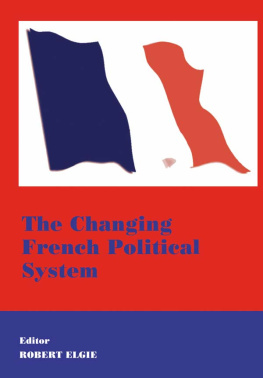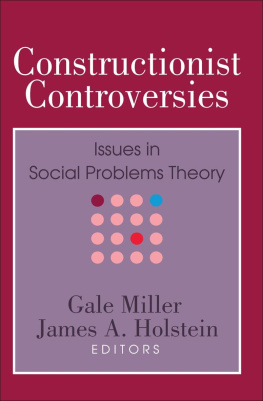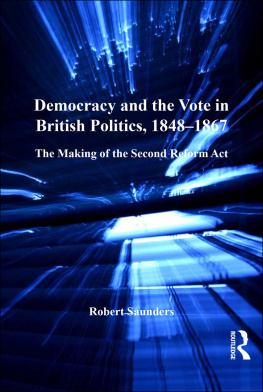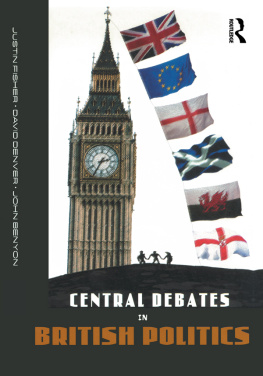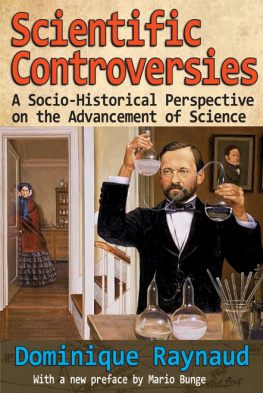French Politics
French Politics presents basic information about the French political system and analyses in detail the most important debates and controversies concerning French politics today. This accessible study explores the numerous ways in which French politics can be interpreted, concluding that the study of French political life is being transformed in response to a changing global, European and domestic environment.
Elgie and Griggs provide an overview of contemporary controversies in French politics, examining key topical issues of the late twentieth century. Subjects covered include:
the changing parameters of state intervention
the relationship between the president and prime minister
interpretations of voting behaviour
the nature of interest group politics
the impact of moves towards European integration.
French Politics highlights the disagreements between those who write about French politics, and argues that these disagreements are often based on radically conflicting interpretations of the French political process. It examines the opposing viewpoints held by these writers and identifies the differences between them, thus providing the student with a comprehensive introduction to the study of French political life. This thorough and concise study is an essential resource for students and scholars of French politics.
Robert Elgie is Senior Lecturer in Politics at the University of Nottingham. He has published widely in the field of French, European and comparative politics. His previous publications include The Role of the Prime Minister in France and Semi-Presidentialism in Europe.
Steven Griggs is Senior Lecturer in Public Policy at Staffordshire University. He has published widely in journals including West European Politics, Parliamentary Affairs and Modern and Contemporary France.
French Politics
Debates and Controversies
Robert Elgie and Steven Griggs
First published 2000
by Routledge
2 Park Square, Milton Park, Abingdon, Oxon OX14 4RN
Simultaneously published in the USA and Canada
by Routledge
711 Third Avenue, New York, NY 10017
Routledge is an imprint of the Taylor & Francis Group, an informa business
2000 Robert Elgie and Steven Griggs
Typeset in Sabon by Taylor & Francis Books Ltd
All rights reserved. No part of this book may be reprinted or reproduced or utilised in any form or by any electronic, mechanical, or other means, now known or hereafter invented, including photocopying and recording, or in any information storage or retrieval system, without permission in writing from the publishers.
British Library Cataloguing in Publication Data
A catalogue record for this book is available from the British Library
Library of Congress Cataloging in Publication Data
Elgie, Robert
French Politics : debates and controversies / Robert Elgie and Steven
Griggs.
p. cm.
Includes bibliographical references and index.
FrancePolitics and government1958 I. Griggs, Steven,
1962 II. Title.
JN2594.2.E54 2000
320.944dc21
99-056248
ISBN 0415174783 (hbk)
ISBN 0415174791 (pbk)
This book is dedicated to the memory of Vincent Wright
Contents
Tables
Models of the French state
Presidents and prime ministers in France, 195998
Models of the French core executive
Models of the French bureaucracy
Models of French local government
The main political parties in France
Models of party/government relations in France
Relationship between party vote and left-right self-placement (per cent)
Relationship between profession and left-right self-placement (per cent)
Relationship between religion and voting behaviour in 1978
Electoral stability in France, 19846 (per cent)
The sociological profile of the new voter, 1988 legislative election (per cent)
Schools of French voting behaviour
Models of interest group politics in France
Models of the French policy-making style
Figures
Dupuys model of interlocking relationships at the local level
The sociological model of voting behaviour
The Lancelot interactionist model of voting behaviour
Mayer and Perrineaus demand and supply model of voting behaviour
Preface
This book is designed to be a textbook on French politics unlike any other. There are already a great many very notable and successful books which provide a comprehensive introduction to French politics and which are written primarily for those whose first language is English. In these books, the author invariably outlines the main institutional and political characteristics of contemporary France and proposes a number of generalisations about the key features of the political system. This book, however, is very different from these standard texts. It does present some basic information about the functioning of certain aspects of the French political system. This information is included in the introductory section to each of the chapters which follow (see below). However, this book does not claim to provide a fully exhaustive account of the many, various and fascinating aspects of French political life, nor does it put forward a general thesis about the nature of the French political system. Instead, the aim of this book is to introduce students to a number of the most important debates and controversies in the study of contemporary French politics. It takes as its starting point the notion that there are disagreements amongst those who write about French politics and that these disagreements are often based on radically conflicting and often, although not always, mutually exclusive interpretations of the French political process. The purpose of the book, therefore, is to highlight the opposing viewpoints held by these writers and to identify the differences between them. In this way, it acts not as a competitor to the standard introductory texts on French politics but as a companion to them. In short, we hope that this book will complement existing textbooks and broaden the range of learning materials available to both students and teachers of French politics alike. In so doing, we also hope that it will stimulate further discussion of French politics and generate yet more debates in the future.
The structure of the book
The standard text on French politics tends to focus on the institutions of government and the politics of representation. Thus, following a brief outline of French political and constitutional history, such a text customarily includes chapters on the presidency and the government, parliament, local government and the civil service. More often than not, the standard text then goes on to examine elections and voting behaviour, political parties, the party system and interest groups. Finally, there is usually a concluding chapter which places France in a European context and/or which examines the extent of change in the contemporary political system. In order to act as a companion to the standard text on French politics, we have structured this book in a somewhat similar way.
The book begins with a chapter on the state. This is an overarching chapter which addresses one of the most long-standing preoccupations of French politics, namely what role does and should the state play in the organisation of political life. It also establishes the main themes which appear throughout the book as a whole, such as internationalisation, Europeanisation, the disaggregation of the policy-making process and the role of the public sector in contemporary democracies. In this way, it sets the scene for many of the debates that are examined in subsequent chapters.



